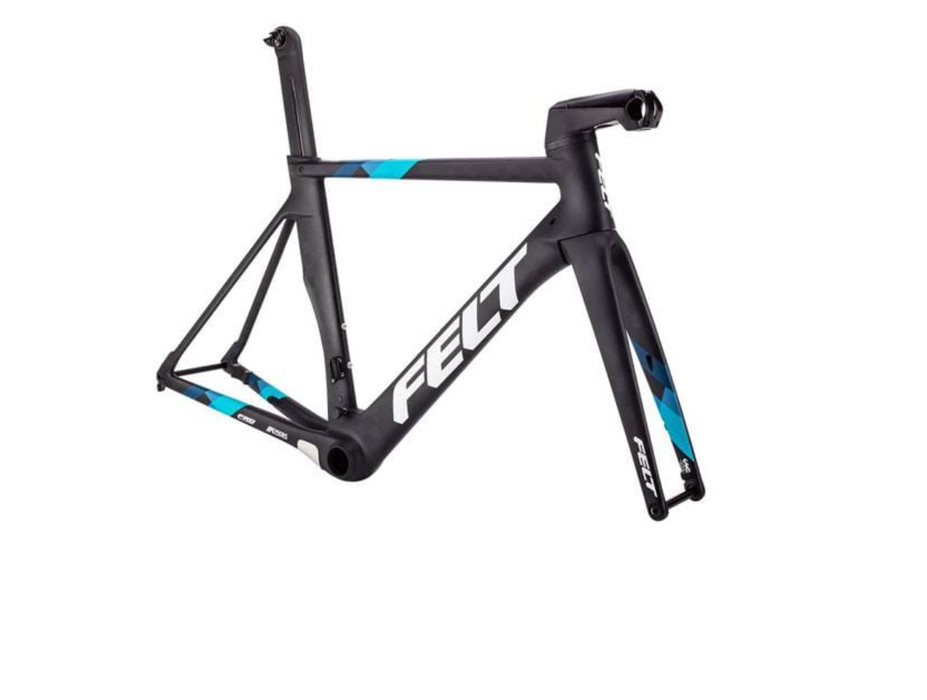AR FRD | ULTIMATE | FRAME
Felt AeroRoad 3.0 | UHC Ultimate + TeXtreme carbon fiber
- Compliance Channel aero seatpost covers
- Carbon assembly paste

Please see photos for detailed specifications.
For additional information, photos or wheel and component upgrades available, please email store@playtri.com or call us at 972-730-3288
Shipping and Financing Available
*Specifications subject to change without notice from manufacturers
Felt AeroRoad 3.0 | UHC Ultimate + TeXtreme carbon fiber
The aero paradigm has evolved. Gone are the elongated, deep-section, teardrop shapes and hard edges that were previously thought to be the most efficient at slicing through the wind. The latest industry research and theories have shifted aero bike development towards truncated, squared-off profiles (sometimes referred to as "Kammtail" designs) that have been optimized for real-world riding conditions. As a result, thoughtfully designed bikes will perform better during the actual riding and racing conditions that cyclists encounter most often. As the performance benefits of this new paradigm have taken hold, we've seen a validation of the speed gains ourselves. Our development of the new AR followed these theoretical models and industry improvements with more deliberate, hands-on efforts to advance our own platform.
Disc brakes are found on the entire Felt road line-up. Our all-around road bike model (FR series), our cyclocross race bike (FX series), and even our flagship triathlon model (IA series)—all of which have won World Championships in recent seasons—feature disc brakes. Through testing and experience, we know that disc brakes can win races on the biggest stage. So from the beginning of the AR project we knew that the next-generation bike would have disc brakes exclusively.
While fully hidden cable routing systems can appear aesthetically minimal when installed in a precise configuration, a truly closed-off system carries with it several drawbacks. Chief among these is a significantly more tedious and time-consuming maintenance process. It also makes the bike more difficult to easily break down for travel. And, due to inherent space constraints, many fully hidden systems can cause excessive wear and tear on cables and housing if not perfectly set up by an expert mechanic. Likewise, one-piece handlebar-and-stem configurations limit a rider’s ability to dial-in their preferred body position, as well as fine-tune their favored steering interface. With the AR’s tried-and-true system, riders have the option of using our semi-integrated stem (in lengths from 80mm to 140mm) or their favorite stem in whatever material and length they prefer, as well as their preferred handlebar in a myriad of materials, shapes, and sizes.
We pioneered a unique seatpost design for the previous-generation AR, and it offered such a high level of aerodynamic efficiency and a superb ride quality that it only made sense that we would revisit it for the new AR. This latest version still features the signature split design that not only allows for an aerodynamically optimized interface between the post and the seat tube junction, but the two halves of the post flex and shear independently of one another, which increases overall rider comfort. We also created a co-molded rubber insert that lives within the junction of the seatpost and seat tube, giving the entire interface added compliance. Finally, the slotted seatpost design allows for the use of a proprietary clamping mechanism that results in a lighter overall setup thanks to the use of thinner carbon walls, and a more finely tuned level of compliance for rider comfort. So what does all this mean? The new AR’s seatpost provides 112% more flex than the seatpost of the previous- generation AR. Purists will say that an aero race bike shouldn’t be “comfortable.” But we disagree.